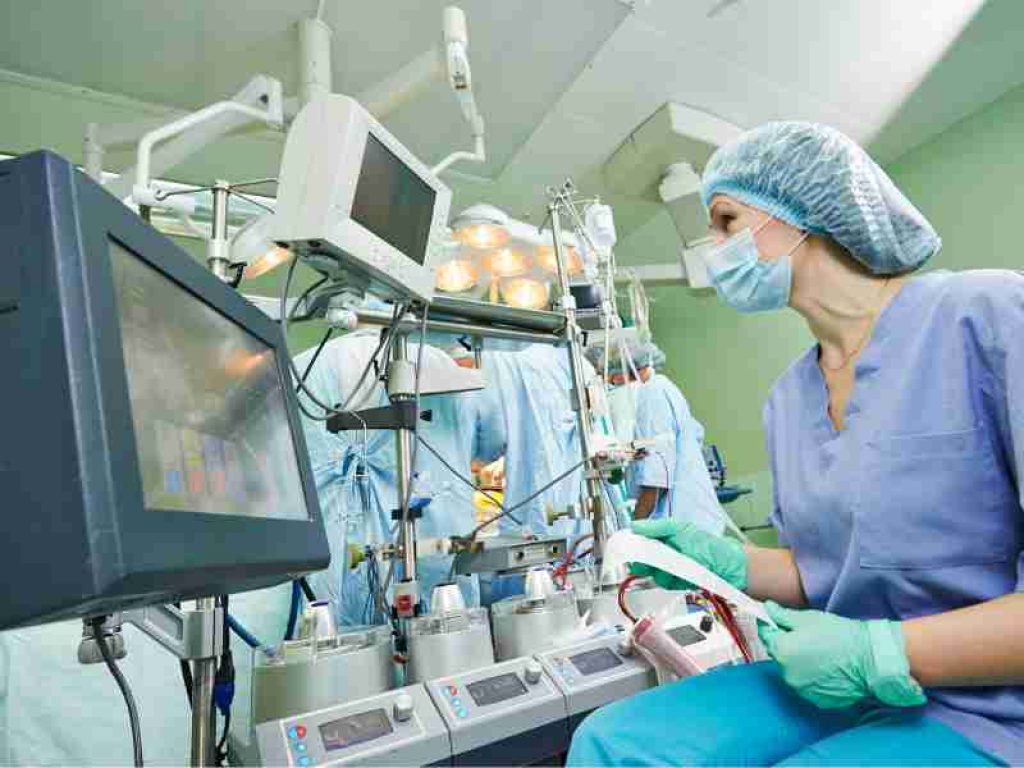
How To Become A Surgical Nurse?
They provide pre-, intra-, and post-operative care for patients undergoing both emergency and elective surgical procedures. They work in medical facilities like clinics and hospitals and have to complete a formal nursing nurse program.
If you’re looking for a demanding and rewarding career in nursing, consider surgical nursing. Learn more about the role of a surgical nurse, salary expectations, and entry requirements in this comprehensive resource.
What is a Surgical Nurse?
A Registered Nurse with specialized training in surgical assistance is called a surgical nurse. Surgical nurses, also known as perioperative nurses or operating room (OR) nurses, teach patients before and after surgery, assist surgeons with complex procedures, monitor patients throughout surgery, and care for patients in the post-surgical recovery area and the medical-surgical wards.

They provide pre-, intra-, and post-operative care for patients undergoing both emergency and elective surgical procedures. They work in medical facilities like clinics and hospitals and have to complete a formal nursing nurse program.
Numerous surgical subspecialties are available for study, such as:
- Neurosurgery
- Interventional Cardiac Surgery
- Trauma
- Pediatrics
- Oncology
- General Surgeries
- Urology
- Ophthalmology
- Ear/nose/throat
- Dental
- Orthopedics
- Both cosmetic and reconstructive
- Organ transplantation
Suppose you decide to pursue a career in perioperative nursing. Regardless of your chosen specialty, you’ll embark on a lifelong learning journey with obstacles, financial benefits, and room for professional development.
What are surgical nurse duties and responsibilities?
The specifics of a nurse’s responsibilities in the operating room depending on the setting in which she works and the area of surgery in which she specializes. There are several different types of surgical nurses, each with specialized duties. Here are a few illustrations:
Operating room Nurse:
Surgical operating rooms are sterile environments, and scrub nurses are responsible for maintaining that sterility (OR). It is their responsibility to ensure that the operating room is set up in a way that is both comfortable for the patient and practical for the surgeons. Nurses in scrubs may be present during surgery to provide the operating team with the required aid.
Circulatory Nurses:
Although they do not work in the sterile area of the operating room, circulating nurses are essential to the smooth operation of the entire surgical facility. Instrument sterilization, getting informed consent signatures, and preoperative risk assessments are all tasks that may fall under their purview.
Registered nurses (RNFA):
Suturing, controlling bleeding, applying bandages, and monitoring the patient for complications are assigned to the RN, who works closely with the surgeon. This is a crucial function in ensuring the patient’s well-being.
Post-anesthesia care nurses:
After surgery, these nurses will typically stay with the patient in the recovery area to ensure they are stable and have fully recovered from the anesthetic. Aside from that, these nurses can aid in getting patients ready for discharge or transfer to another ward.
Medicine and surgery Nurses:
The goal of the nurses who work in the medical-surgical unit is to ensure the patient’s patients well-being and speedy recovery after surgical procedures. Nurses in this position may perform various diagnostic and therapeutic procedures to protect their patients from complications, including infection, excessive bleeding, swelling, and excruciating pain.
What are the skills of a surgical nurse?
The following abilities are necessary for a surgical nurse:
Focus on the Specifics:
The ability to recognize and respond to changes in a patient’spatient’s health is essential for surgical nurses.
Communication:
If the patient’spatient’s vital signs are not optimal, the surgical nurse is responsible for communicating this to the surgical team. Nurses in this role are tasked with educating patients and their families about the surgical process and preparing them for it.
Multitasking:
Surgical nurses often work under pressure to multitask both before and during surgeries. Vital signs monitoring and coordinating with the anesthesiologist team are two examples. By supporting the surgeon and monitoring the patient’spatient’s condition, nurses contribute to the success of surgical procedures and ensure patient safety.
Expertise in a Particular Field of Study:
Nurses should be well-versed in many scientific disciplines, including human anatomy and physiology, chemistry, nutrition, and microbiology.
How to Become a Surgical Nurse?

A surgical/perioperative nurse must meet the following requirements:
Enroll in a reputable nursing school:
A two-year program resulting in an Associate’sAssociate’s degree in nursing, a three-year program leading to a diploma in nursing (often hospital-based), or a four-year program leading to a Bachelor’sBachelor’s degree in nursing are all required to become a registered nurse.
Get your NCLEX-RN certification:
Upon graduating from nursing school, nurses must sit the NCLEX-RN (National Council Licensure Examination) in order to be licensed as Registered Nurses. The National Council Licensure Examination for Registered Nurses (NCLEX-RN) is a certification test for nurses working in the United States and Canada.
Obtaining Credentials:
Earning your certification after you’ve already established yourself as a perioperative nurse is a great way to further your career and your earning potential. The perioperative nursing specialty offers the Certified Neonatal Intensive Care Nurse (CNOR), Certified Family Practice Nurse (CFPN), and Certified Neonatal Advanced Practice Nurse (CNAMB) credentials.
Obtain More Education and Work Experience:
Following successful completion of the NCLEX, you will be eligible to apply for entry-level nursing positions. Becoming a perioperative nurse who assists patients throughout the surgical process (from pre- to post-op) typically necessitates an additional year of schooling and training.
This can be obtained through a post-perioperative bachelor’s certificate program or an on-the-job training program at a hospital or surgical center. Previous work in either critical care or emergency nursing would be useful preparation for this course.
A Core Curriculum” is a web-based course by the Association of Perioperative Registered Nurses (AORN). This course explores anesthesia, surgical draping, patient and gear safety, and other related topics. Lab and clinical experiences are also provided.
What is the work environment of a surgical nurse?

Many people believe that surgical nurses only work in hospitals but can work in various locations. Here are a few illustrations:
- Ambulatory surgery centers
- Day surgery centers
- Clinics
- Private practices with their own OR facilities
- Hospitals (including operating rooms and recovery rooms)
What is Certification Requirement for Surgical Nurses?
Medical-surgical nursing is a specialty that can be certified by surgical nurses. The three main requirements for becoming a certified surgery nurse are exam passing, continuous education, and work experience. Many firms will cover the costs for their employees regarding certification and ongoing education.
Acquiring certification to become a surgical nurse demonstrates the necessary qualifications in this area. It demonstrates your dedication to learning new things and keeping your skills current. Obtaining certification is a common requirement or preferred qualification for working in the field of surgical nursing.
Get certified and take your career to the next level with credentials from organizations like the Medical-Surgical Nursing Certification Board and the American Nurses Credentialing Center! Certifications must be updated periodically through retraining, with fees paid and an examination passed in order to remain valid for five years.
What are some other related career paths for surgical nurses?
Careers in related fields for surgical nurses include:
- Certified Nursing Assistant
- Vocational Nurse with a License
- Doctor of Nursing Practice
- Traveling Nurse
What are some advancement opportunities for surgical nurses?
Nurses working in the perioperative setting can advance to nurse anesthetists, patient educators, and operating room directors with the right amount of education and training. On surgical teams, nurse anesthetists may assist anesthesiologists or act as the sole anesthesiologist in charge. A surgical unit’sunit’s budget and schedule are within the purview of the director, who oversees the unit’sunit’s personnel.
How much does a Surgical Nurse make?
The average annual salary for a surgical nurse is approximately $71,000, with some making over $80,000 yearly. However, accreditation opens doors to higher-paying jobs and more earning potential.
FAQ’s
Is surgical nursing hard?
In nursing, perioperative nurses face some of the highest stress levels. Having only one person handling the entire patient load indicates how seriously they take the prevention of errors. Nurses need ways to deal with the mental and physical strain of working in an operating room.
Is surgical nursing a good career?
Having a steady nurse is another perk of working in an operating room. According to the U.S. Bureau of Labor Statistics, the nursing career may rise by 9% from 2020 to 2030, which is a rate as fast as the average. You may feel more secure in your career and have more options regarding where you can work.
Do surgical nurses perform surgery?
Independent surgical operations are beyond the scope of practice for nurses. Before, during, and after surgical procedures, nurses can play a variety of functions. Think about getting extra schooling or training to help you land the career you want.
Can a surgical nurse become a doctor?
Not as a means of getting ahead in the medical field.







